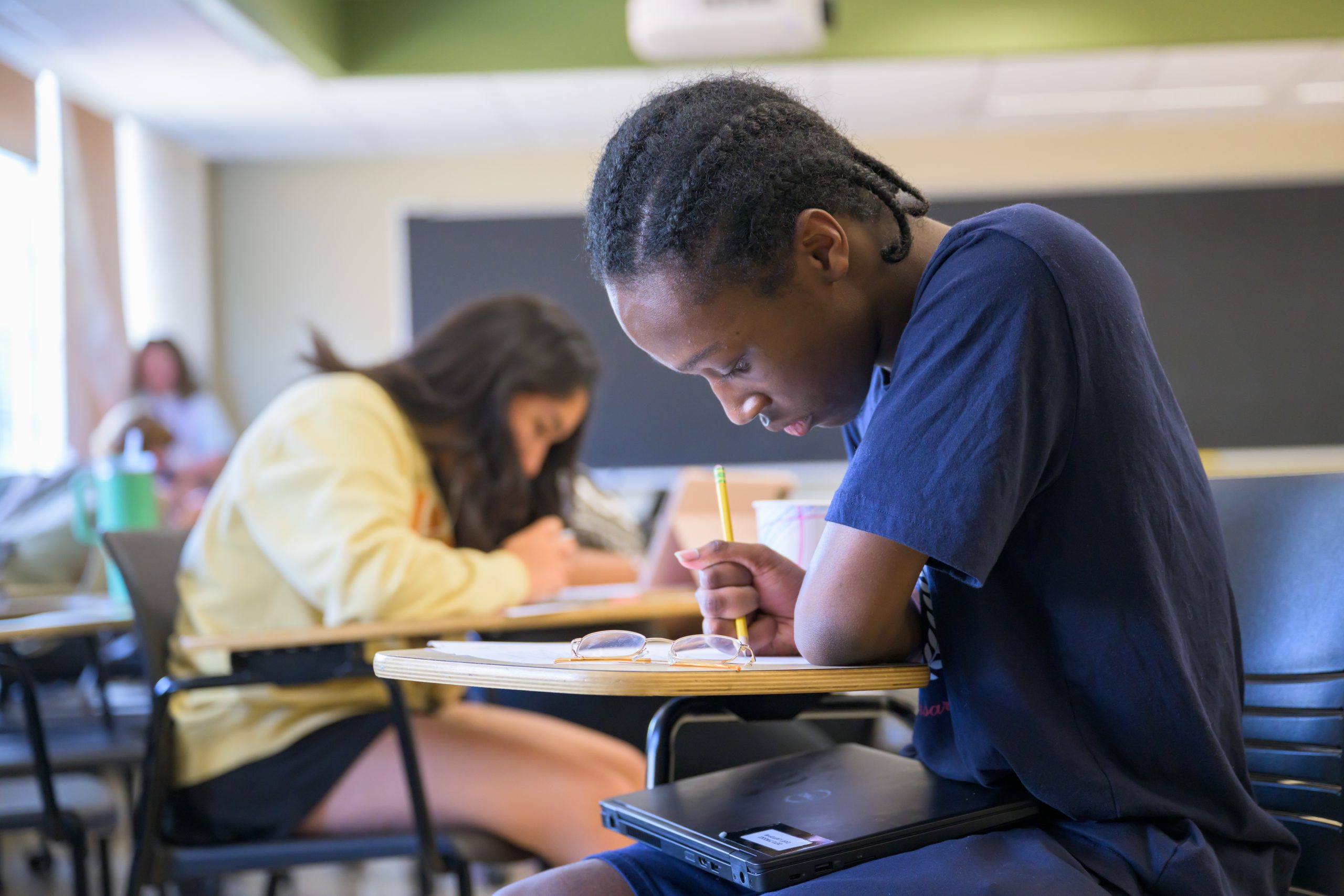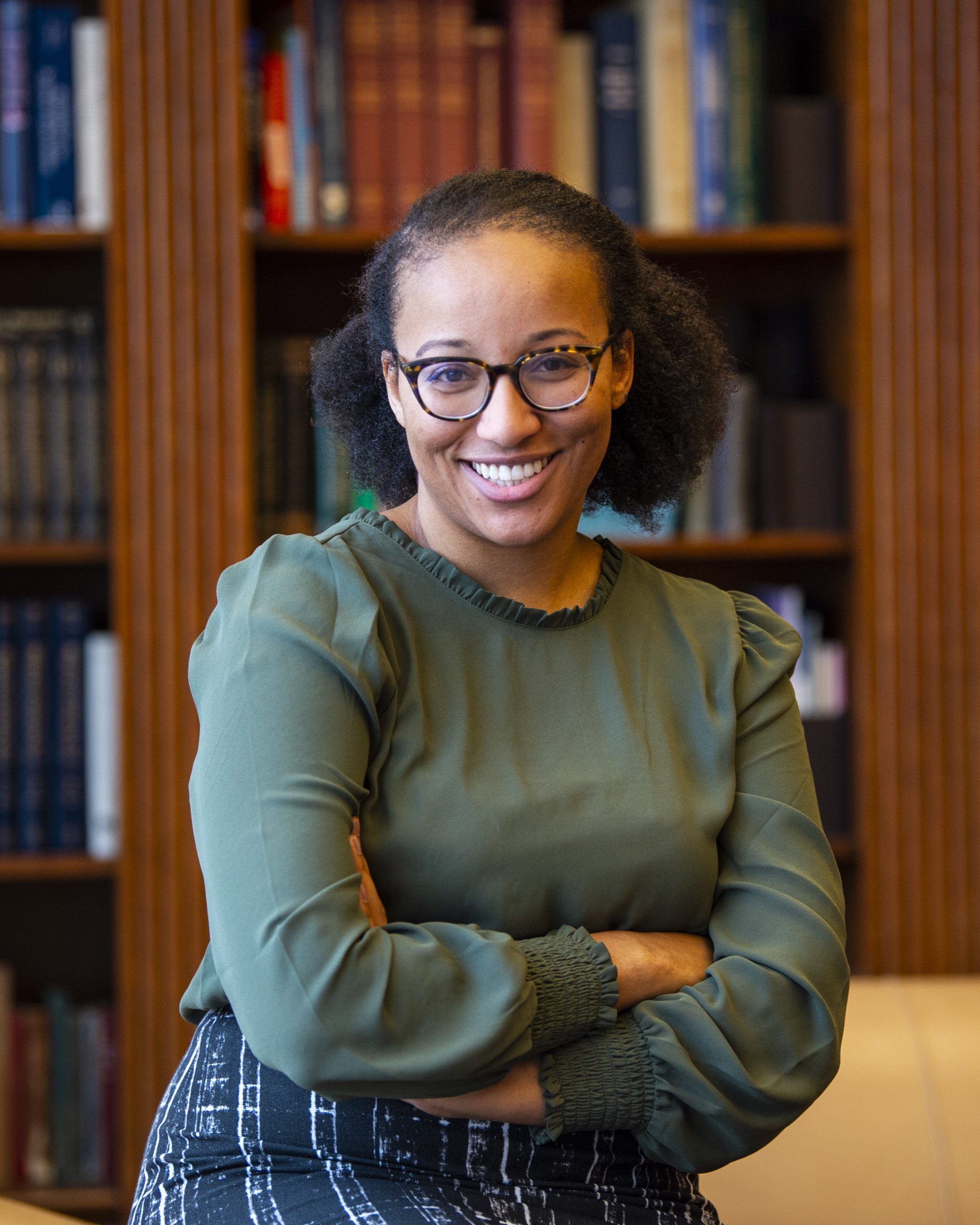Research Spotlight: Dominique Baker

Associate Professor Dominique Baker analyzes extracurricular activities in the college admissions process to improve access to college
In recent years, discussions about inequality in the college admissions process have focused on the use of standardized tests like the SAT. But few discussions have focused on another important part of the college application: the listing of extracurricular activities. With new research on the reporting of extracurriculars, University of Delaware Associate Professor Dominique Baker offers new ways to ensure that all students have an equal opportunity to demonstrate their academic and leadership potential.
With colleagues from multiple universities, the Common App and the College Admissions Futures Co-Laborative, Baker analyzed extracurricular activity descriptions in more than 6 million applications submitted through the Common App. After controlling for the number of reported activities on each application, there were little to no differences in the percentage of activities with top-level leadership roles for different racial/ethnic groups. However, white, Asian, wealthier and private-school students reported more activities, top-level leadership roles and distinctive accomplishments than their peers in other racial, ethnic and socioeconomic groups.
“All students do not have the ability to sign up for eight, 10 or 15 extracurricular activities,” said Dominique Baker, who specializes in education policy in the College of Education and Human Development and the Joseph R. Biden School of Public Policy and Administration. “For example, some students need to work to help their family be able to afford their housing and groceries. Now that we can see these patterns in reporting, we can help organizations like the Common App and individual admissions offices create a better process for applying to college.”
Analyzing extracurricular activities
Using natural language processing methods, Baker and her colleagues analyzed extracurricular activities and self-described accomplishments (like leadership positions and awards) among students who applied to at least one selective university during the 2018-19 and 2019-20 admission cycles. The study included students across all racial, ethnic and socioeconomic groups, as well as first-generation college students.
They found that all student groups, regardless of race or socioeconomic status, reported at least four extracurricular activities on average. When controlling for the number for reported activities, underrepresented minority (URM) students reported the same percentage of leadership roles and honors, like “captain,” “president,” “most valuable player” and “first prize.”
However, disparities between applicants appeared once the researchers removed controls for the number of reported activities. White applicants reported nearly 57% more activities on average than Black applicants, non-URM applicants reported an average of 34% more activities than URM applicants and continuing-generation applicants reported an average of nearly 42% more activities than first-generation applicants. Private-school students listed an average of nearly 19% more activities than public-school students, including about 37% more athletic activities.
“As someone who studies education policy and access to higher education, I think these results are very helpful for admissions offices to better understand the norms and trends in how students report extracurriculars,” Baker noted. “Research shows that admissions offices’ abilities to contextualize the environment students learn within has a strong relationship with institutional diversity.”
Recommendations for the college admissions process
Baker and her colleagues’ findings reveal that URM and first-generation college students are able to participate in fewer extracurricular activities than their white, Asian and wealthier peers, accounting for more limited participation. With this knowledge, it may be tempting to simply omit extracurricular activities from application processes that heavily value the breadth of a student’s extracurriculars. But Baker and her colleagues recommend a different approach.
Among other recommendations, Baker and her colleagues suggest reducing the maximum number of possible activities on the Common App, which currently allows students to list up to 10. Reducing this number to four or five and encouraging admissions readers to focus on the quality and intensity of a student’s participation (rather than the breadth and quantity) may level the playing field for students who do not have the opportunity to participate in such a large number of activities.
In addition, Baker and her colleagues encourage college admissions staff to take opportunity, hardship and other contextual factors into consideration when they evaluate applications. Given the high turnover in college admissions, Baker and her colleagues recommend formal training for personnel that helps them make fair evaluations.
These recommendations make sense to Jamie Bailey, a student recruiter for teacher preparation programs in CEHD’s Center for Excellence and Equity in Teacher Preparation. She travels across Delaware to speak with high school students about careers in education and helps familiarize them with UD’s application process.
“As someone who recruits high school students into education pathways, I see firsthand how structural barriers impact students’ ability to showcase their talents,” Bailey said. “We can break down these barriers by adopting a more holistic review process that values lived experiences and resilience as much as formal activities and leadership positions. Reducing the number of required activities and training admissions staff on these disparities are essential steps toward a more balanced review process.”
In March 2024, Baker was named one of the top 40 women in higher education by Diverse: Issues in Higher Education.
To learn more about CEHD research in education and social policy, visit its research webpage.
Article by Jessica Henderson. Image by Evan Krape.

About Dominique Baker
Dominique Baker is an associate professor in the CEHD’s School of Education and the Joseph R. Biden, Jr. School of Public Policy and Administration at the University of Delaware. Her research focuses on the way that education policy affects and shapes the access and success of underrepresented students in higher education. She investigates student financial aid, college admissions policies and other policies that influence campus climate. In March 2024, she was named one of the top 40 women in higher education in 2025 by Diverse: Issues in Higher Education.
This research complements the work of CEHD faculty studying education and social policy, including Ann Aviles, Lauren Bailes, George Bear (emeritus), Martha Buell, Roderick L. Carey, Laura Desimone, Valerie Earnshaw, Elizabeth Farley-Ripple, Sue Giancola, Rena Hallam, Gary T. Henry, Jason Hustedt, Allison Karpyn, Erica Litke, Henry May, Leigh McLean, Florence Ran, Barbara Settles, Kenneth Shores, Bryan VanGronigen and Anamarie Whitaker.



